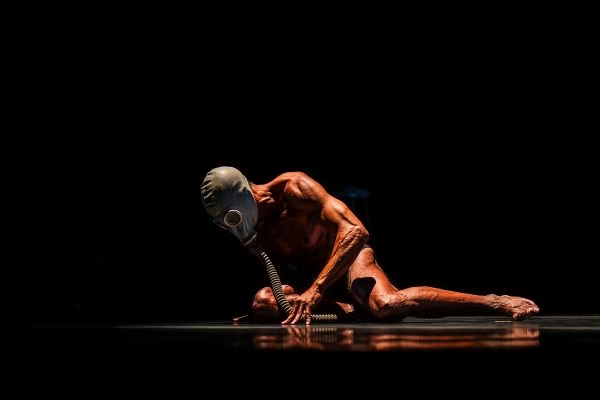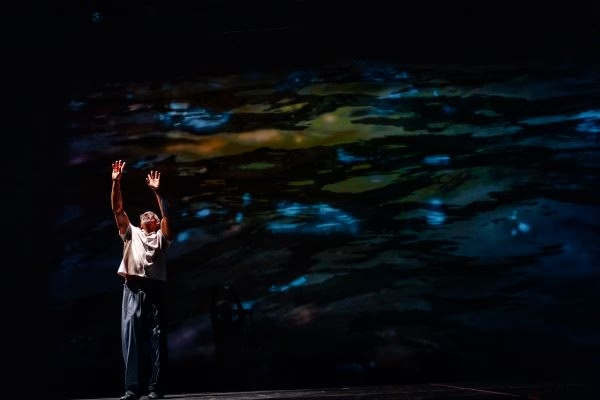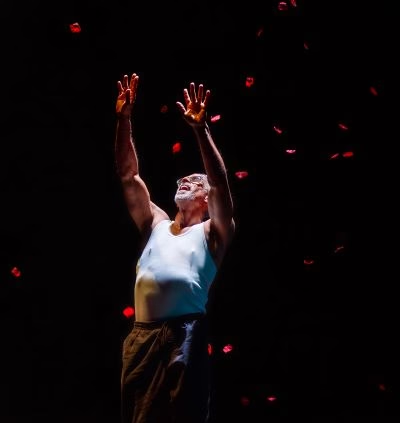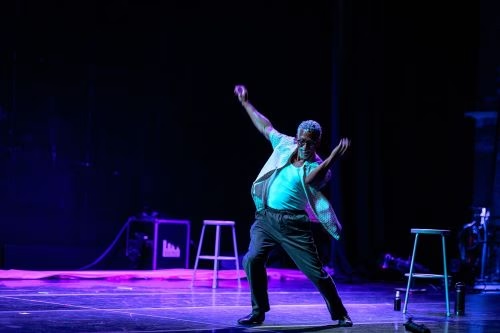
David Roussève Charts Life, Loss and Resilience
Telling a personal narrative that digs through 600 years of DNA history while incorporating a body of work that spans 40 years in dance seems like a feat only David Roussève could accomplish. And he did just that in Becoming Daddy AF, a powerful dance performance presented in October at CAP UCLA’s Nimoy Theater.
Written, created, and performed by David Roussève, Becoming Daddy AF draws on his seminal dance-theater pieces created for his company REALITY, weaving them into a new narrative that bridges past and present.
Becoming Daddy AF includes references to realities of racism, violence, sexual assault, enslavement and suicide. This truthful, first-hand telling charts the life of an African American man born in the U.S. in 1959 — and the histories his body holds, presented in three parts: 1. Love 2. Family and 3. Freedom — or “Love and family = freedom.”

Love
Roussève, standing in front of a film backdrop of undulating ocean waves, began with his birth story. Portrayed initially through joyful movement, the dancer moved his arms and hands progressively in heartfelt, fluid gestures, in an unmistakable body language, depicting an artistic expression of childbirth. This was followed by Roussève’s narration, delivered in an exuberant Creole dialect, as his mother, telling the story of “King David’s” birth by a white Jewish doctor (who sent the “perfect” infant David to ICU for five days because of his misdiagnosis of jaundice when noticing Roussève’s “yellow” ie, Creole coloring upon delivery — unaware that “Creole babies take some time to brown up”).
Driven by deeply personal stories around love and family, Becoming Daddy AF uses humor to explore many of these themes, including 600 years of genealogy (from France, Portugal, Germany, Mali, Senegal, Haiti and Cuba), a roller coaster journey with HIV, and the shattering loss of a husband of 26 years. Roussève revisits movement from 35 years of dance-making to explore the meaning of virtuosity for a 65-year-old body.
Through his experiences and a professorial explication, Roussève’s performance reveals a man defying death while unable to fully embrace life. He recounts two divergent childhood events. The first is a sweet boyhood belief that a magical creature with a symbol of love, portrayed on stage as a vision of Peter Pan, would come to him. The second was about his being “inappropriately touched” by a male cousin, which subsequently allowed Roussève to discover his “super power” — disengagement. He became a master of disengagement, able to do so in an instant, yet he also managed to pour all of his emotion into his art.
Roussève talked about when he met the love of his life, his husband of 26 years, Conor, at a funeral. “Grief became love,” said Roussève. “Twenty-nine years later. love became grief and then transformed again.” Through this relationship, Roussève discovered what he called unconditional love, a love that helped him navigate the trials of an HIV diagnosis. A medication he was prescribed for HIV treatment destroyed the cells that make up the fatty deposits in your face. The effects of this left Roussève with a skeleton appearance, of sunken eyes and a face of only skin and bone. Fading away, he began to call himself “Skeletor.” This name upset Conor deeply, who, in response, rebuked Roussève for saying such a thing about himself.
Later, during the winter of 2018, to Roussève’s devastation, he and Conor divorced. One thing Conor never told Roussève was that he loved him. But after 10 years of couples therapy, the two promised to stay together, forever, as a queer family. This is where grief transformed to love again.
Family
Roussève’s narratives of his family included how his grandfather traced his family’s history and discovered many branches on the Roussève side, which ended up being largely white. It wasn’t lost on Roussève that while he was thankful for the records, he understood this was because of the privilege of record keeping not afforded to his Creole mother’s side of his family. Yet, he did know about his “cunning” maternal great, great grandfather who had a brain for business and could also dance. Other histories told of the elder Roussève men who were all “dedicated to the betterment of negro people” in their careers, including his father, Roland Roussève, who, even as it was a “disappointment” to his parents, achieved success as a well-known professional French Quarter jazz musician. He was also one of the first African Americans to enter graduate school at Louisiana State University.
Additionally, in 1977, while attending Princeton University, Roussève was told by an older professor who recognized his name that his grandfather wrote a book titled The History of the Negro in Louisiana. (Slides of the still-unpublished manuscript were on view in the lobby of the theater.)
Freedom
Roussève recounted his close brush with death when he spent three weeks in the hospital in 2009; he had given up, feeling he had no reason to live. Conor returned to visit him — after their divorce — and Roussève knew he couldn’t die; he had a reason to live. He “lives for love,” and this was the bittersweet manifestation of agony and ecstasy for Roussève.
At 65 years of age, Roussève stands, through his diagnosis, still performing, writing, creating and working. This in itself is a profound statement on the power of love and family in life, and for the dancer, this equates to freedom. Indeed, Roussève noted Becoming Daddy AF is dedicated to the four great loves of his life: his mother, Genevieve Arceneaux Roussève; his father, Roland Raymond Roussève Sr.; his first husband, Conor McTeague; and his current husband, Steven Rubenstein.
Notably, Becoming Daddy AF’s diegetic sound was excellent. It included both well-known and loved jazz and R’n’B numbers, along with either original or lesser-known tunes that were remarkably beautiful and captured the emotion of Roussève’s narratives.
In an especially joyful part, Roussève performed to Nat King Cole’s L-O-V-E, showcasing his elegance in an exuberant expression of dance. After the show, during a brief conversation, CAP UCLA director of education and special initiatives, Meryl Friedman, told Roussève she recently heard someone say, “You are what you remember.” Remarking on his performance to
L-O-V-E, Friedman noted that she could see what Roussève’s body remembers. Roussève replied, “I know it, they [the audience] see it,” which recalled his assertion that the body knows the truth.
Details: www.davidrousseve.com


